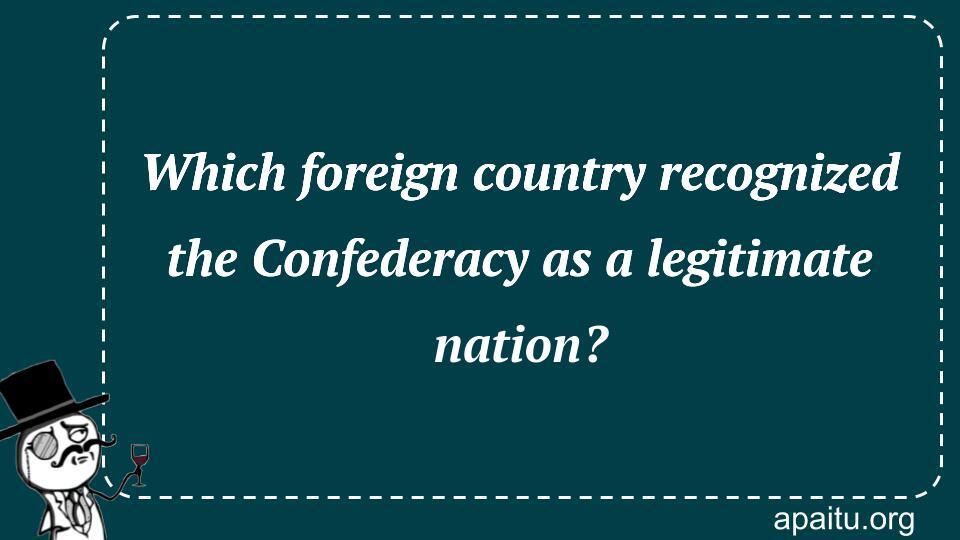Question
Here is the question : WHICH FOREIGN COUNTRY RECOGNIZED THE CONFEDERACY AS A LEGITIMATE NATION?
Option
Here is the option for the question :
- France
- England
- Germany
- None
The Answer:
And, the answer for the the question is :
Explanation:
During the entirety of the war, not a single nation outside of the United States recognized the Confederacy as an established nation in its own right. This was in part owing to the antagonism that society in European countries had towards the institution of slavery, which the Confederacy was trying to maintain. It was also in part owing to the fact that the American South did not achieve any decisive wins throughout the duration of the conflict.

During the American Civil War, which lasted from 1861 to 1865, the Confederate States of America, also known as the Confederacy, sought international recognition as a legitimate nation separate from the United States. However, despite their efforts, no foreign country officially recognized the Confederacy as an independent state. This lack of recognition had significant implications for the Confederacy’s diplomatic efforts and its ability to secure international support.
One of the main reasons for the lack of foreign recognition was the political and economic interests of other nations during that time. Several European powers, such as Britain and France, had strong economic ties with the United States, particularly in terms of trade. These countries relied heavily on cotton imports from the southern states, which were a major source of revenue for the Confederacy. However, the Union blockade of Confederate ports severely disrupted cotton exports, causing economic hardships for these European nations.
Moreover, the issue of slavery was a major factor in the lack of foreign recognition. The Confederacy’s economy was heavily dependent on slave labor, and many European nations had already abolished slavery or were in the process of doing so. The moral and ethical implications of supporting a nation built on the institution of slavery made it difficult for these countries to extend recognition to the Confederacy.
Another significant factor was the Union’s diplomatic efforts to prevent foreign recognition of the Confederacy. The United States government, led by President Abraham Lincoln, actively worked to persuade other nations to withhold recognition from the Confederacy. Union diplomats argued that recognizing the Confederacy would be seen as supporting a rebellion against a legitimate government, undermining the principles of democracy and national sovereignty.
the Confederacy made several attempts to gain international recognition. It sent diplomats abroad to negotiate treaties and establish diplomatic relations with foreign governments. However, these efforts were largely unsuccessful. The Confederate diplomats faced challenges in presenting a convincing case for recognition, as many nations were hesitant to take sides in a conflict that was tearing apart a nation they had diplomatic relations with.
Ultimately, the lack of foreign recognition had significant consequences for the Confederacy. Without the support and legitimacy that recognition would have provided, the Confederacy struggled to secure loans, acquire war materiel, and maintain diplomatic alliances. The Union’s blockade and military campaigns further isolated the Confederacy and weakened its ability to sustain itself economically and militarily.
despite its efforts, the Confederate States of America failed to gain international recognition as a legitimate nation during the American Civil War. The political and economic intere